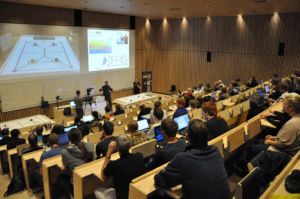News
Duration of master’s degrees to be shortened
This article is more than 2 years old.

Will the reforms help or hinder studetns? (photo: Institut for Datalogi, Aarhus Universitet)
The government has confirmed its plans to reduce a number of two-year master’s degrees to a length of 15 months, reports DR.
The education minister, Christina Egelund, described the current master’s system as “clumsy”, emphasising a need to make them more adaptable and orientated towards the labour market.
The government has not yet announced which programs are to be shortened.
In addition to these reductions, some master’s degrees will be stretched to three years. This will most likely happen in more ‘complex’ subjects, such as quantum physics and nanotechnology.
It’s not for the dosh, honest!
The economy minister, Troels Lund Poelsen, insisted that the changes were not a money-saving scheme. “It is an investment,” he clarified.
According to DR, however, Parliament stands to make a gain of over 2 billion kroner a year after the measures come into effect.
Poelsen said the surplus will be poured into education and resources for young people.
U-turn in Parliament
Before the election, both Venstre and Moderaterne were against plans to shorten master’s degrees proposed by the then Socialdemokratiet one-party government.
Asked about this change in heart, Egelund, a member of Moderaterne, replied: “If you represent us as simply wanting to shorten courses without investing in quality education and without doing any further training – just shortening them – it is clear that you think that it does not sound like the best idea in the world.”
Egelund’s argument was that the reforms would lead to higher-quality education.
General protests from other parties
The plans have drawn widespread criticism from both students’ unions and opposition parties.
Esben Bjørn Solomonsen, the head of the Danish Students’ Council, has queried whether one-year master’s degrees will leave enough time for internships – an integral part of many programs.
“Academics are some of those who contribute the most value to society, and I think we should stick to that,” added Solomensen.
Enhedslisten and Radikale are also worried. Mai Villadsen, speaking on behalf of Enhedslisten, described the changes as “a violent attack on our education system and our welfare”.
In addition, Villadsen expressed fears of dividing the labour market into two groups with differing prospects: “Young people risk being faced with a labour market with an A and B team, where those with the standard two-year master’s degree leapfrog the B team with the one-year degree in the job queue.”










































